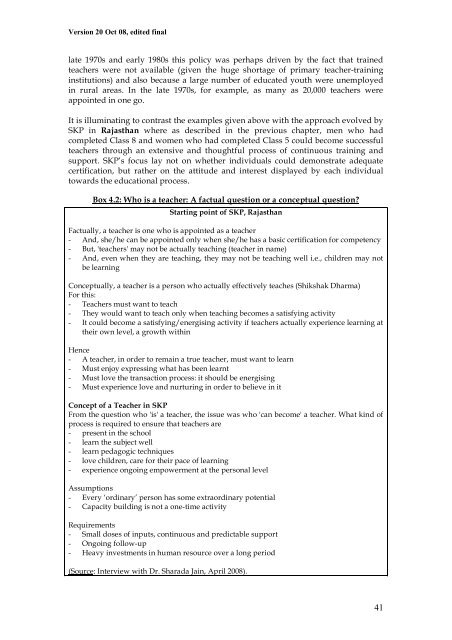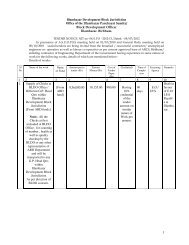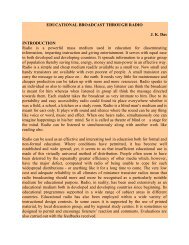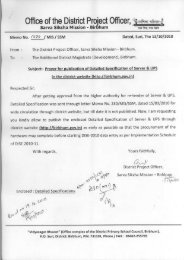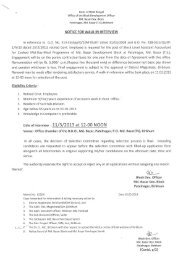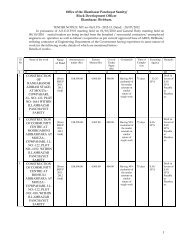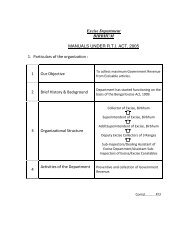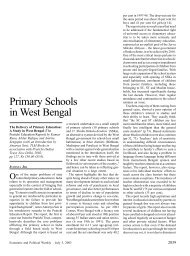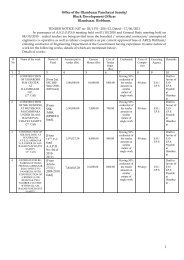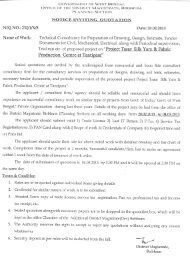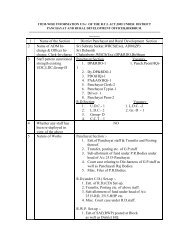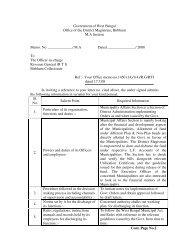primary school teachers the twists and turns of ... - ERU Consultants
primary school teachers the twists and turns of ... - ERU Consultants
primary school teachers the twists and turns of ... - ERU Consultants
You also want an ePaper? Increase the reach of your titles
YUMPU automatically turns print PDFs into web optimized ePapers that Google loves.
Version 20 Oct 08, edited finallate 1970s <strong>and</strong> early 1980s this policy was perhaps driven by <strong>the</strong> fact that trained<strong>teachers</strong> were not available (given <strong>the</strong> huge shortage <strong>of</strong> <strong>primary</strong> teacher-traininginstitutions) <strong>and</strong> also because a large number <strong>of</strong> educated youth were unemployedin rural areas. In <strong>the</strong> late 1970s, for example, as many as 20,000 <strong>teachers</strong> wereappointed in one go.It is illuminating to contrast <strong>the</strong> examples given above with <strong>the</strong> approach evolved bySKP in Rajasthan where as described in <strong>the</strong> previous chapter, men who hadcompleted Class 8 <strong>and</strong> women who had completed Class 5 could become successful<strong>teachers</strong> through an extensive <strong>and</strong> thoughtful process <strong>of</strong> continuous training <strong>and</strong>support. SKP’s focus lay not on whe<strong>the</strong>r individuals could demonstrate adequatecertification, but ra<strong>the</strong>r on <strong>the</strong> attitude <strong>and</strong> interest displayed by each individualtowards <strong>the</strong> educational process.Box 4.2: Who is a teacher: A factual question or a conceptual question?Starting point <strong>of</strong> SKP, RajasthanFactually, a teacher is one who is appointed as a teacher- And, she/he can be appointed only when she/he has a basic certification for competency- But, '<strong>teachers</strong>' may not be actually teaching (teacher in name)- And, even when <strong>the</strong>y are teaching, <strong>the</strong>y may not be teaching well i.e., children may notbe learningConceptually, a teacher is a person who actually effectively teaches (Shikshak Dharma)For this:- Teachers must want to teach- They would want to teach only when teaching becomes a satisfying activity- It could become a satisfying/energising activity if <strong>teachers</strong> actually experience learning at<strong>the</strong>ir own level, a growth withinHence- A teacher, in order to remain a true teacher, must want to learn- Must enjoy expressing what has been learnt- Must love <strong>the</strong> transaction process: it should be energising- Must experience love <strong>and</strong> nurturing in order to believe in itConcept <strong>of</strong> a Teacher in SKPFrom <strong>the</strong> question who 'is' a teacher, <strong>the</strong> issue was who 'can become' a teacher. What kind <strong>of</strong>process is required to ensure that <strong>teachers</strong> are- present in <strong>the</strong> <strong>school</strong>- learn <strong>the</strong> subject well- learn pedagogic techniques- love children, care for <strong>the</strong>ir pace <strong>of</strong> learning- experience ongoing empowerment at <strong>the</strong> personal levelAssumptions- Every ‘ordinary’ person has some extraordinary potential- Capacity building is not a one-time activityRequirements- Small doses <strong>of</strong> inputs, continuous <strong>and</strong> predictable support- Ongoing follow-up- Heavy investments in human resource over a long period(Source: Interview with Dr. Sharada Jain, April 2008).41


